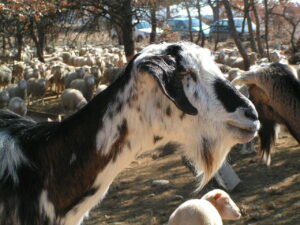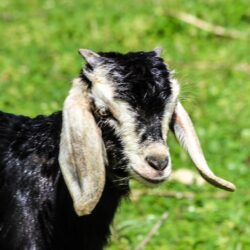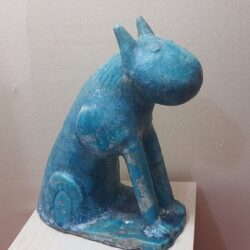Judeo-Provençal was, of course, largely oral rather than spoken, but when written down it often followed the Hebrew pronunciation norms of the Comtat, and boy oh boy are those something! Sound shifts relevant to this text include:
שׁ = /s/ or intervocalic /z/
ס = /f/
ז = /v/
word-final בֿ = /w/
word-final דֿ = /z/
consonantal י = /tʃ~ʃ/
word-final or unvoiced-letter adjacent ר = /χ/
Thus, חַד becomes “Rhaz.”
| Source (Aramaic) | Translation (Judeo-Provençal, romanized) | Translation (Judeo-Provençal) | Translation (English) |
|---|---|---|---|
חַד גַּדְיָא, חַד גַּדְיָא. דְּזַבִּן אַבָּא בִּתְרֵי זוּזֵי, חַד גַּדְיָא, חַד גַּדְיָא. |
Un cabri, un cabri qu’avé ‘tchéta moun païre un escu, dous escu. Qu’avé ‘tchéta moun païre un escu, dous escu… rhaz gadeïa, rhaz gadeïa! |
אוּן קַאבְּרִי, אוּן קַאבְּרִי, קַאזֵי יֵטָה מוּן פַּיירֵי אוּן אֶשְׁקוּ, דּוּשׁ אֶשְׁקוּ, קַאזֵי יֵטָה מוּן פַּיירֵי אוּן אֶשְׁקוּ, דּוּשׁ אֶשְׁקוּ, חַדֿ גַּדְיָא, חַדֿ גַּדְיָא! |
One little goat, one little goat That my father bought for two zuzim. That my father bought for two zuzim. One little goat, one little goat. |
וְאָתָא שֻׁנְרָא וְאָכְלָה לְגַדְיָא, דְּזַבִּן אַבָּא בִּתְרֵי זוּזֵי, חַד גַּדְיָא, חַד גַּדְיָא. |
Es vengu lou ca qu’avé mandja lou cabri qu’avé ‘tchéta moun païre un escu, dous escu. Qu’avé ‘tchéta moun païre un escu, dous escu… rhaz gadeïa, rhaz gadeïa! |
אֶשׁ זֶנְגוּ לוּקַה קַאזֵי מַאנְגָֿה לוּקַאבְּרִי, קַאזֵי יֵטָה מוּן פַּיירֵי אוּן אֶשְׁקוּ, דּוּשׁ אֶשְׁקוּ, קַאזֵי יֵטָה מוּן פַּיירֵי אוּן אֶשְׁקוּ, דּוּשׁ אֶשְׁקוּ, חַדֿ גַּדְיָא, חַדֿ גַּדְיָא! |
A cat came and ate the goat That my father bought for two zuzim. That my father bought for two zuzim. One little goat, one little goat. |
וְאָתָא כַּלְבָּא וְנָשַׁךְ לְשֻׁנְרָא, דְּאָכְלָה לְגַדְיָא, דְּזַבִּן אַבָּא בִּתְרֵי זוּזֵי, חַד גַּדְיָא, חַד גַּדְיָא. |
Es vengu lou tchin qu’avé mourdu lou ca qu’avé mandja lou cabri qu’avé ‘tchéta moun païre un escu, dous escu. Qu’avé ‘tchéta moun païre un escu, dous escu… rhaz gadeïa, rhaz gadeïa! |
אֶשׁ זֶנְגוּ לוּיִין קַאזֵי מוּרְדּוּ לוּקָה קַאזֵי מַאנְגָֿה לוּקַאבְּרִי, קַאזֵי יֵטָה מוּן פַּיירֵי אוּן אֶשְׁקוּ, דּוּשׁ אֶשְׁקוּ, קַאזֵי יֵטָה מוּן פַּיירֵי אוּן אֶשְׁקוּ, דּוּשׁ אֶשְׁקוּ, חַדֿ גַּדְיָא, חַדֿ גַּדְיָא! |
A dog came and bit the cat that ate the goat that my father bought for two zuzim. that my father bought for two zuzim. One little goat, one little goat. |
וְאָתָא חֻטְרָא וְהִכָּה לְכַלְבָּא, דְּנָשַׁךְ לְשֻׁנְרָא, דְּאָכְלָה לְגַדְיָא, דְּזַבִּן אַבָּא בִּתְרֵי זוּזֵי, חַד גַּדְיָא, חַד גַּדְיָא. |
Es vengu la vergue qu’avé pica lou tchin qu’avé mourdu lou ca qu’avé mandja lou cabri qu’avé ‘tchéta moun païre un escu, dous escu. Qu’avé ‘tchéta moun païre un escu, dous escu… rhaz gadeïa, rhaz gadeïa! |
אֶשׁ זֶנְגוּ לַזֵרְגֵּי קַאזֵי פִּיקָה לוּיִין קַאזֵי מוּרְדּוּ לוּקָה קַאזֵי מַאנְגָֿה לוּקַאבְּרִי, קַאזֵי יֵטָה מוּן פַּיירֵי אוּן אֶשְׁקוּ, דּוּשׁ אֶשְׁקוּ, קַאזֵי יֵטָה מוּן פַּיירֵי אוּן אֶשְׁקוּ, דּוּשׁ אֶשְׁקוּ, חַדֿ גַּדְיָא, חַדֿ גַּדְיָא! |
A stick came and hit the dog that bit the cat that ate the goat that my father bought for two zuzim. that my father bought for two zuzim. One little goat, one little goat. |
וְאָתָא נוּרָא וְשָׂרַף לְחֻטְרָא, דְּהִכָּה לְכַלְבָּא, דְּנָשַׁךְ לְשֻׁנְרָא, דְּאָכְלָה לְגַדְיָא, דְּזַבִּן אַבָּא בִּתְרֵי זוּזֵי, חַד גַּדְיָא, חַד גַּדְיָא. |
Es vengu lou fiou qu’avé brula la vergue qu’avé pica lou tchin qu’avé mourdu lou ca qu’avé mandja lou cabri qu’avé ‘tchéta moun païre un escu, dous escu. Qu’avé ‘tchéta moun païre un escu, dous escu… rhaz gadeïa, rhaz gadeïa! |
אֶשׁ זֶנְגוּ לוּסִיבֿ קַאזֵי בְּרוּלָה לַזֵרְגֵּי קַאזֵי פִּיקָה לוּיִין קַאזֵי מוּרְדּוּ לוּקָה קַאזֵי מַאנְגָֿה לוּקַאבְּרִי, קַאזֵי יֵטָה מוּן פַּיירֵי אוּן אֶשְׁקוּ, דּוּשׁ אֶשְׁקוּ, קַאזֵי יֵטָה מוּן פַּיירֵי אוּן אֶשְׁקוּ, דּוּשׁ אֶשְׁקוּ, חַדֿ גַּדְיָא, חַדֿ גַּדְיָא! |
A fire came and burned the stick that hit the dog that bit the cat that ate the goat that my father bought for two zuzim. that my father bought for two zuzim. One little goat, one little goat. |
וְאָתָא מַיָּא וְכָבָה לְנוּרָא, דְּשָׂרַף לְחֻטְרָא, דְּהִכָּה לְכַלְבָּא, דְּנָשַׁךְ לְשֻׁנְרָא, דְּאָכְלָה לְגַדְיָא, דְּזַבִּן אַבָּא בִּתְרֵי זוּזֵי, חַד גַּדְיָא, חַד גַּדְיָא. |
Es vengu toute l’aïgue qu’ave moussa lou fiou qu’avé brula la vergue qu’avé pica lou tchin qu’avé mourdu lou ca qu’avé mandja lou cabri qu’avé ‘tchéta moun païre un escu, dous escu. Qu’avé ‘tchéta moun païre un escu, dous escu… rhaz gadeïa, rhaz gadeïa! |
אֶשׁ זֶנְגוּ טוּטֶי לַאיגֶּי קַאזֵי מוּשָׁה לוּסִיבֿ קַאזֵי בְּרוּלָה לַזֵרְגֵּי קַאזֵי פִּיקָה לוּיִין קַאזֵי מוּרְדּוּ לוּקָה קַאזֵי מַאנְגָֿה לוּקַאבְּרִי, קַאזֵי יֵטָה מוּן פַּיירֵי אוּן אֶשְׁקוּ, דּוּשׁ אֶשְׁקוּ, קַאזֵי יֵטָה מוּן פַּיירֵי אוּן אֶשְׁקוּ, דּוּשׁ אֶשְׁקוּ, חַדֿ גַּדְיָא, חַדֿ גַּדְיָא! |
Water came and put out the fire that burned the stick that hit the dog that bit the cat that ate the goat that my father bought for two zuzim. that my father bought for two zuzim. One little goat, one little goat. |
וְאָתָא תּוֹרָא וְשָׁתָא לְמַיָּא, דְּכָבָה לְנוּרָא, דְּשָׂרַף לְחֻטְרָא, דְּהִכָּה לְכַלְבָּא, דְּנָשַׁךְ לְשֻׁנְרָא, דְּאָכְלָה לְגַדְיָא, דְּזַבִּן אַבָּא בִּתְרֵי זוּזֵי, חַד גַּדְיָא, חַד גַּדְיָא. |
Es vengu lou biou qu’avé bégu toute l’aïgue qu’ave moussa lou fiou qu’avé brula la vergue qu’avé pica lou tchin qu’avé mourdu lou ca qu’avé mandja lou cabri qu’avé ‘tchéta moun païre un escu, dous escu. Qu’avé ‘tchéta moun païre un escu, dous escu… rhaz gadeïa, rhaz gadeïa! |
אֶשׁ זֶנְגוּ לוּבִּיבֿ קַאזֵי בֵּיגּוּ טוּטֶי לַאיגֶּי קַאזֵי מוּשָׁה לוּסִיבֿ קַאזֵי בְּרוּלָה לַזֵרְגֵּי קַאזֵי פִּיקָה לוּיִין קַאזֵי מוּרְדּוּ לוּקָה קַאזֵי מַאנְגָֿה לוּקַאבְּרִי, קַאזֵי יֵטָה מוּן פַּיירֵי אוּן אֶשְׁקוּ, דּוּשׁ אֶשְׁקוּ, קַאזֵי יֵטָה מוּן פַּיירֵי אוּן אֶשְׁקוּ, דּוּשׁ אֶשְׁקוּ, חַדֿ גַּדְיָא, חַדֿ גַּדְיָא! |
An ox came and drank the water that put out the fire that burned the stick that hit the dog that bit the cat that ate the goat that my father bought for two zuzim. that my father bought for two zuzim. One little goat, one little goat. |
וְאָתָא הַשּׁוֹחֵט וְשָׁחַט לְתוֹרָא, דְּשָׁתָא לְמַיָּא, דְּכָבָה לְנוּרָא, דְּשָׂרַף לְחֻטְרָא, דְּהִכָּה לְכַלְבָּא, דְּנָשַׁךְ לְשֻׁנְרָא, דְּאָכְלָה לְגַדְיָא, דְּזַבִּן אַבָּא בִּתְרֵי זוּזֵי, חַד גַּדְיָא, חַד גַּדְיָא. |
Es vengu lou sorhet qu’avé sorhéta lou biou qu’avé bégu toute l’aïgue qu’ave moussa lou fiou qu’avé brula la vergue qu’avé pica lou tchin qu’avé mourdu lou ca qu’avé mandja lou cabri qu’avé ‘tchéta moun païre un escu, dous escu. Qu’avé ‘tchéta moun païre un escu, dous escu… rhaz gadeïa, rhaz gadeïa! |
אֶשׁ זֶנְגוּ לוּ־שׁוֹחֵט קַאזֵי שׁוֹחֵטָה לוּבִּיבֿ קַאזֵי בֵּיגּוּ טוּטֶי לַאיגֶּי קַאזֵי מוּשָׁה לוּסִיבֿ קַאזֵי בְּרוּלָה לַזֵרְגֵּי קַאזֵי פִּיקָה לוּיִין קַאזֵי מוּרְדּוּ לוּקָה קַאזֵי מַאנְגָֿה לוּקַאבְּרִי, קַאזֵי יֵטָה מוּן פַּיירֵי אוּן אֶשְׁקוּ, דּוּשׁ אֶשְׁקוּ, קַאזֵי יֵטָה מוּן פַּיירֵי אוּן אֶשְׁקוּ, דּוּשׁ אֶשְׁקוּ, חַדֿ גַּדְיָא, חַדֿ גַּדְיָא! |
A butcher came and slaughtered the ox that drank the water that put out the fire that burned the stick that hit the dog that bit the cat that ate the goat that my father bought for two zuzim. that my father bought for two zuzim. One little goat, one little goat. |
וְאָתָא מַלְאַךְ־הַמָּ֫וֶת וְשָׁחַט לְשׁוֹחֵט, דְּשָׁחַט לְתוֹרָא, דְּשָׁתָא לְמַיָּא, דְּכָבָה לְנוּרָא, דְּשָׂרַף לְחֻטְרָא, דְּהִכָּה לְכַלְבָּא, דְּנָשַׁךְ לְשֻׁנְרָא, דְּאָכְלָה לְגַדְיָא, דְּזַבִּן אַבָּא בִּתְרֵי זוּזֵי, חַד גַּדְיָא, חַד גַּדְיָא. |
Es vengu lou malarhama qu’avé sorhéta lou sorhet qu’avé sorhéta lou biou qu’avé bégu toute l’aïgue qu’ave moussa lou fiou qu’avé brula la vergue qu’avé pica lou tchin qu’avé mourdu lou ca qu’avé mandja lou cabri qu’avé ‘tchéta moun païre un escu, dous escu. Qu’avé ‘tchéta moun païre un escu, dous escu… rhaz gadeïa, rhaz gadeïa! |
אֶשׁ זֶנְגוּ לוּ־מַלְאָךְ הַמָּה קַאזֵי שׁוֹחֵטָה לוּ־שׁוֹחֵט קַאזֵי שׁוֹחֵטָה לוּבִּיבֿ קַאזֵי בֵּיגּוּ טוּטֶי לַאיגֶּי קַאזֵי מוּשָׁה לוּסִיבֿ קַאזֵי בְּרוּלָה לַזֵרְגֵּי קַאזֵי פִּיקָה לוּיִין קַאזֵי מוּרְדּוּ לוּקָה קַאזֵי מַאנְגָֿה לוּקַאבְּרִי, קַאזֵי יֵטָה מוּן פַּיירֵי אוּן אֶשְׁקוּ, דּוּשׁ אֶשְׁקוּ, קַאזֵי יֵטָה מוּן פַּיירֵי אוּן אֶשְׁקוּ, דּוּשׁ אֶשְׁקוּ, חַדֿ גַּדְיָא, חַדֿ גַּדְיָא! |
The Angel of Death came and slaughtered the shoḥet who slaughtered the ox that drank the water that put out the fire that burned the stick that hit the dog that bit the cat that ate the goat that my father bought for two zuzim. that my father bought for two zuzim. One little goat, one little goat. |
וְאָתָא הַקָּדוֹשׁ־בָּרוּךְ־הוּא וְשָׁחַט לְמַלְאַךְ־הַמָּ֫וֶת דְּשָׁחַט לְשׁוֹחֵט, דְּשָׁחַט לְתוֹרָא, דְּשָׁתָא לְמַיָּא, דְּכָבָה לְנוּרָא, דְּשָׂרַף לְחֻטְרָא, דְּהִכָּה לְכַלְבָּא, דְּנָשַׁךְ לְשֻׁנְרָא, דְּאָכְלָה לְגַדְיָא, דְּזַבִּן אַבָּא בִּתְרֵי זוּזֵי, חַד גַּדְיָא, חַד גַּדְיָא. |
Es vengu lou cados barourhou qu’avé sorhéta lou malarhama qu’avé sorhéta lou sorhet qu’avé sorhéta lou biou qu’avé bégu toute l’aïgue qu’ave moussa lou fiou qu’avé brula la vergue qu’avé pica lou tchin qu’avé mourdu lou ca qu’avé mandja lou cabri qu’avé ‘tchéta moun païre un escu, dous escu. Qu’avé ‘tchéta moun païre un escu, dous escu… rhaz gadeïa, rhaz gadeïa! |
אֶשׁ זֶנְגוּ לוּ־קָדוֹשׁ־בָּרוּךְ־הוּא קַאזֵי שׁוֹחֵטָה מַלְאָךְ־הַמָּה קַאזֵי שׁוֹחֵטָה לוּ־שׁוֹחֵט קַאזֵי שׁוֹחֵטָה לוּבִּיבֿ קַאזֵי בֵּיגּוּ טוּטֶי לַאיגֶּי קַאזֵי מוּשָׁה לוּסִיבֿ קַאזֵי בְּרוּלָה לַזֵרְגֵּי קַאזֵי פִּיקָה לוּיִין קַאזֵי מוּרְדּוּ לוּקָה קַאזֵי מַאנְגָֿה לוּקַאבְּרִי, קַאזֵי יֵטָה מוּן פַּיירֵי אוּן אֶשְׁקוּ, דּוּשׁ אֶשְׁקוּ, קַאזֵי יֵטָה מוּן פַּיירֵי אוּן אֶשְׁקוּ, דּוּשׁ אֶשְׁקוּ, חַדֿ גַּדְיָא, חַדֿ גַּדְיָא! |
Then the blessed Holy One came and slaughtered the Angel of Death who slaughtered the shoḥet who slaughtered the ox that drank the water that put out the fire that burned the stick that hit the dog that bit the cat that ate the goat that my father bought for two zuzim. that my father bought for two zuzim. One little goat, one little goat. |
This is a translation of Ḥad Gadya into Judeo-Provençal, largely based on a recording made by Eliane Amado Levi-Valensi (ca. 1972).
The earliest known appearance of “Ḥad Gadya,” by an unknown author, can be found, handwritten, in the Prague Haggadah (1526). The Aramaic has been vocalized according to the Prague Haggadah (1590). Besides the transcription of the Aramaic with its vocalization, I have also added an English translation adapted from Eve Levavi Feinstein’s Passover Haggadah translation. –Aharon N. Varady
Notes
| 1 | Judeo-Provençal is sometimes referred to as Shuadit, “a word invented in 1948 by a Polish scholar, Zosa Szajkowski, notwithstanding the fact that the language had never been known under that name by its speakers” (via the Wikipedia article “Judeo-Provençal” citing Nahon, Peter. n.d. Judeo-Provençal. Jewish Language Website, Sarah Bunin Benor (ed.). Los Angeles: Jewish Language Project.) |
|---|

“חַד גַּדְיָא | Rhaz Gadeïa — a Judeo-Provençal translation of Ḥad Gadya” is shared through the Open Siddur Project with a Creative Commons Attribution-ShareAlike 4.0 International copyleft license.










Leave a Reply